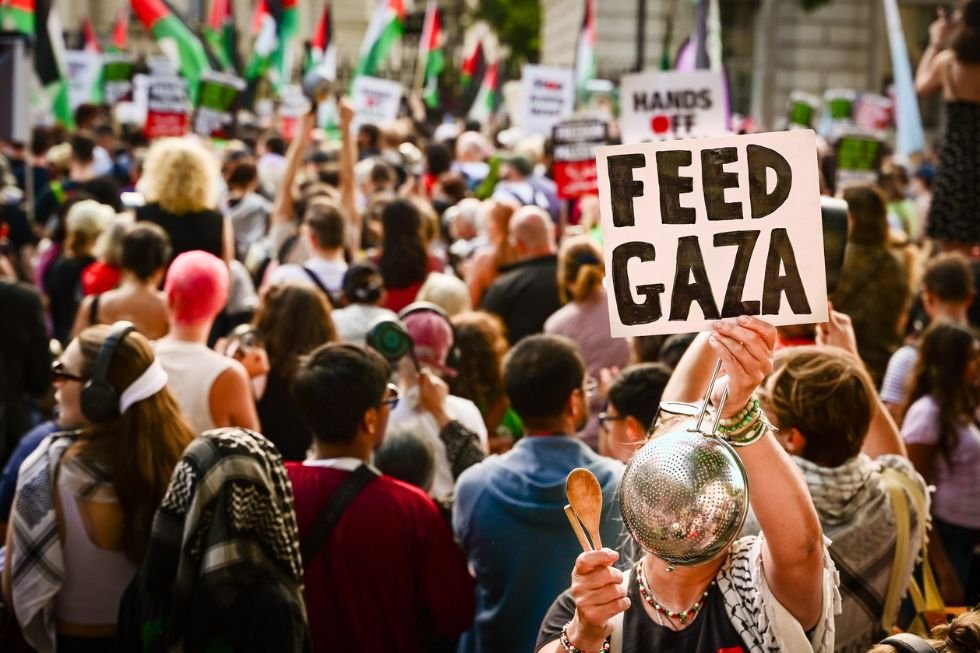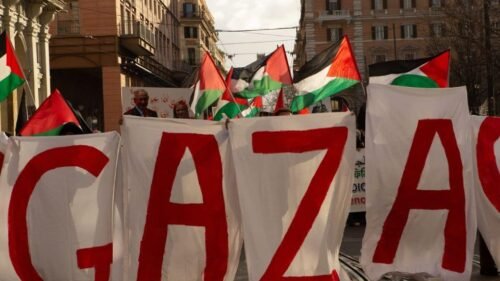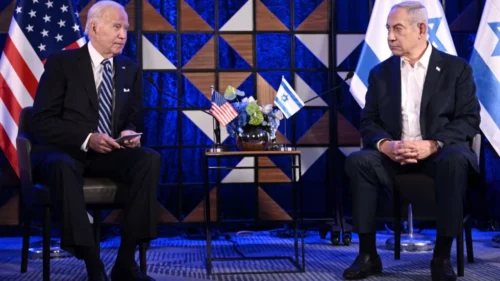The current idealistic interpretation of international law is in ruins and fails to account for the unrest in world politics. It seems that international law is experiencing a significant change and is at a concerning juncture. Questions arise: Is international law still liberal, progressive and internationally enforced? Is the US-Europe relationship complicit in the death of international law, which they promulgated to serve their interests post World War II?
The crisis in Gaza is a stark indictment of how international law bias, multilateral institutional inertia and US-Europe prosecutorial discretion can converge to systematically erode access to justice for victims of Israeli-sponsored apartheid and, what some call, genocide. Institutional norms and global institutions have abruptly deteriorated. Even if Palestine filed a complaint with the UN Security Council, the General Assembly or the International Court of Justice (ICJ) — bodies established to resolve state disputes — the outcome would most likely not be upheld. The International Criminal Court’s (ICC) mere establishment confirms a presumption of culpability for certain international crimes.
The good faith of nation-states has always been essential for the functioning of international law, but it has deteriorated over time. In July, the world’s leading authority on hunger crises officially announced that Gaza is currently experiencing a Phase 5 famine, which is the highest classification and, in this instance, entirely man-made.
Gaza humanitarian crisis
It won’t be shocking to learn that more than half a million people in the Gaza Strip are living in horrific conditions marked by famine, misery and death, according to the UN-backed Integrated Food Security Phase Classification (IPC). Human rights organizations continue to plead with international leaders to halt the killing in Gaza, while humanitarian organizations warn that the future of international law is at risk. Experts and academics agree that this is the case in geopolitics and regional orders, and, more significantly, it is what we have witnessed and experienced.
Suppose we do not condemn this as a genocide and remain mute when US tax funds, ample arms supplies and unwavering political cover expose the shamefulness of American culpability. In that case, we are betraying every moral standard. Humanity demands that atrocities be named, voices be raised, and indifference exposed when human life and dignity are so callously disregarded.
As of August 2025, multiple sources confirm that Gaza is experiencing a severe humanitarian crisis, with famine conditions declared in parts of the region, particularly Gaza City. The IPC has reported that over half a million Palestinians — approximately a quarter of Gaza’s population — are facing “catastrophic conditions characterized by starvation, destitution and death”. The IPC has confirmed famine in Gaza City and warned of likely famine in Deir al-Balah and Khan Yunis within a month, with insufficient data to rule out famine in North Gaza.
Gaza engineered famine
Since March 2025, there has been an Israeli blockade that severely restricts the flow of food, water, medicine and fuel into Gaza. This blockade followed a complete siege declared after October 7, 2023. Israeli officials, like Energy Minister Israel Katz, have made explicit statements indicating that “no humanitarian aid will enter Gaza.” As a result, Palestinians are experiencing collective punishment and manufactured starvation under what many describe as an apartheid siege.
Airstrikes have targeted critical food infrastructure, including bakeries, mills and water treatment facilities, exacerbating scarcity. Aid restrictions have drastically reduced the amount of assistance entering Gaza, with fewer than 10 trucks allowed daily compared to the 600 needed. Delays, inspections, and attacks on convoys have further limited delivery. Reports indicate that over 3,000 aid trucks are stranded at the borders, unable to provide the necessary support.
As of September 2, 360 deaths have been directly attributed to starvation, with children and the elderly being the most affected. UNICEF recorded that 5,119 children aged six months to five years were admitted for treatment of acute malnutrition in May 2025 alone. The number of malnourished children in the Gaza Strip is growing at a startling rate.
As of September 4, 2025, famine and malnutrition are eroding children’s bodies while bombardments endanger their every move, and relocation deprives them of care and shelter. Approximately 85–93% of Gaza’s population is in IPC Phase 5 (catastrophic food insecurity), resulting in widespread malnutrition, stunted growth and psychological trauma.
Several sources describe the famine as engineered or deliberate, primarily attributing responsibility to Israeli policies. Famine expert Alex de Waal, in interviews with Glenn Greenwald and others, calls Gaza’s crisis the most severe and minutely engineered act of deliberate starvation since World War II. He argues that it surpasses famines in British India (Bengal Famine), Ethiopia, Sudan and Yemen in terms of intensity. He also claims that Israel had the means to prevent the famine at every stage but chose not to, despite aid resources being available just a few miles away.
UN experts and non-governmental organization (NGO) statements, including those by the UN High Commissioner for Human Rights Volker Türk, have stated that Israel’s restrictions on aid may constitute starvation as a weapon of war, which is considered a war crime under international law. Human Rights Watch and others describe the blockade as collective punishment and potentially genocidal, citing the Fourth Geneva Convention (1949) and the Rome Statute (1998).
Historically, some sources frame the famine as part of a longer policy of economic strangulation. In 2023, Sara Roy, a Gaza economy expert, noted that Israel’s 56-year occupation has transformed Gaza into an isolated enclave dependent on aid, with deliberate restrictions on resources like arable land and water since the early 2000s. Internal Israeli documents from 2006 to 2008 reveal a policy of keeping Gaza’s economy “on the brink of collapse” through calculated caloric restrictions.
US-Europe complicity in Gaza
Sources do not explicitly support the specific claim that the US and Europe have engineered a famine, but it emerges indirectly through accusations of complicity. The US is repeatedly cited as Israel’s primary enabler through military aid, diplomatic support and funding. Critics argue that US financial aid helps sustain the blockade, along with continued arms supplies and vetoes of UN resolutions opposing Israel’s actions. The US rejection of USAID findings — which indicated that Israel was blocking food aid — and its dismissal of ICC arrest warrants for Israeli leaders, are seen as shielding Israel from accountability.
The Gaza Humanitarian Foundation (GHF), a US-based organization led by American figures like Johnnie Moore Jr., faces criticism for politicizing and weaponizing humanitarian aid. UN agencies and NGOs, such as Doctors Without Borders, refuse to cooperate with GHF, alleging that it employs mercenaries and private contractors, which leads to unsafe and degrading aid distribution. Reports of over 1,400 Palestinians killed at GHF aid sites highlight these concerns.
European complicity is implicated to a lesser extent, but Germany, as Israel’s second-largest arms supplier, is noted for suppressing pro-Palestinian activism and protests, which implies tacit support for Israel’s policies. Additionally, European banks are mentioned for funding settlement infrastructure, indirectly supporting the broader occupation.
Critics argue that Western governments’ failure to impose sanctions, arms embargoes or to pressure for a ceasefire enables the famine. The sanctioning of UN Special Rapporteur Francesca Albanese and threats against the ICC further suggest Western efforts to silence criticism.
Analyzing the evidence
The evidence strongly supports the existence of a man-made famine in Gaza, driven by Israel’s blockade and the destruction of infrastructure. Official statements and historical policies suggest that this is done with deliberate intent. The “engineered” nature of the famine is reinforced by expert analyses (e.g., de Waal) and UN findings, which highlight the precision and intensity of the starvation tactics. Additionally, the US’s role as a key supporter of Israel, combined with the controversial GHF, lends credence to claims of US complicity.
However, referring to “US-Europe” as a unified entity is less clear, as Europe’s involvement is more indirect. Thus, the narrative is not without gaps. Israeli denials and claims of Hamas interference introduce ambiguity, though these are undermined by the lack of evidence and the scale of the blockade’s impact. The absence of direct Western policy documents explicitly endorsing starvation weakens the “engineered by US-Europe” claim. Nevertheless, their failure to act decisively against the crisis suggests complicity through inaction.
As of September 2025, the famine in Gaza is a well-documented humanitarian catastrophe, with substantial evidence pointing to Israel’s deliberate policies as the primary cause, supported by expert testimony and UN reports. The US’s military and diplomatic backing, alongside the GHF’s problematic role, implicates it in enabling the crisis. On the other hand, Europe’s role is less direct but notable through arms supplies and the suppression of protests.
While the term “US-Europe Engineered” may overstate coordinated intent, the West’s failure to counter Israel’s actions contributes significantly to the ongoing starvation. It is a concerning point for the future of international law.
[Kaitlyn Diana edited this piece.]
The views expressed in this article are the author’s own and do not necessarily reflect Fair Observer’s editorial policy.
Support Fair Observer
We rely on your support for our independence, diversity and quality.
For more than 10 years, Fair Observer has been free, fair and independent. No billionaire owns us, no advertisers control us. We are a reader-supported nonprofit. Unlike many other publications, we keep our content free for readers regardless of where they live or whether they can afford to pay. We have no paywalls and no ads.
In the post-truth era of fake news, echo chambers and filter bubbles, we publish a plurality of perspectives from around the world. Anyone can publish with us, but everyone goes through a rigorous editorial process. So, you get fact-checked, well-reasoned content instead of noise.
We publish 3,000+ voices from 90+ countries. We also conduct education and training programs
on subjects ranging from digital media and journalism to writing and critical thinking. This
doesn’t come cheap. Servers, editors, trainers and web developers cost
money.
Please consider supporting us on a regular basis as a recurring donor or a
sustaining member.
Will you support FO’s journalism?
We rely on your support for our independence, diversity and quality.








Comment